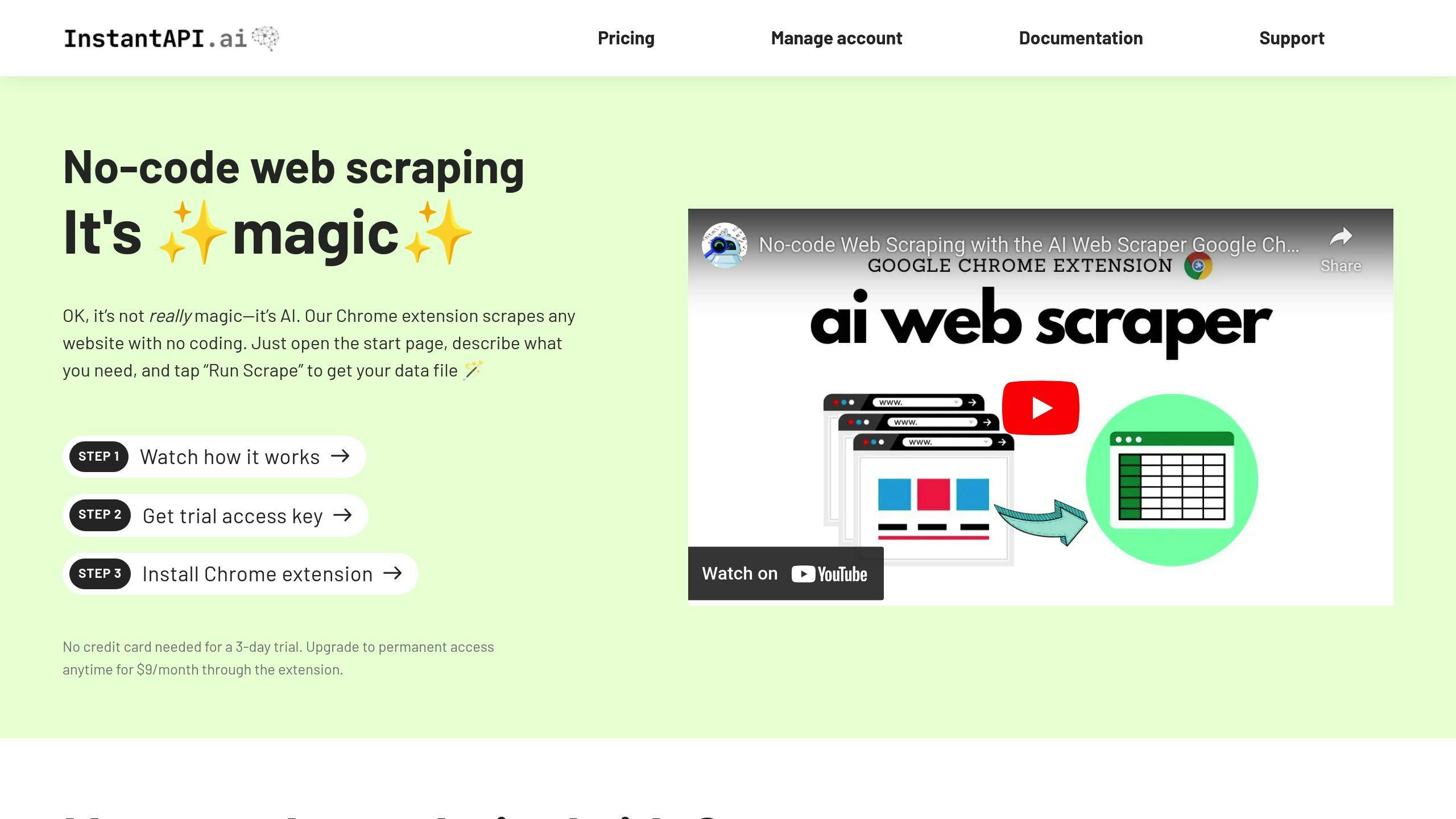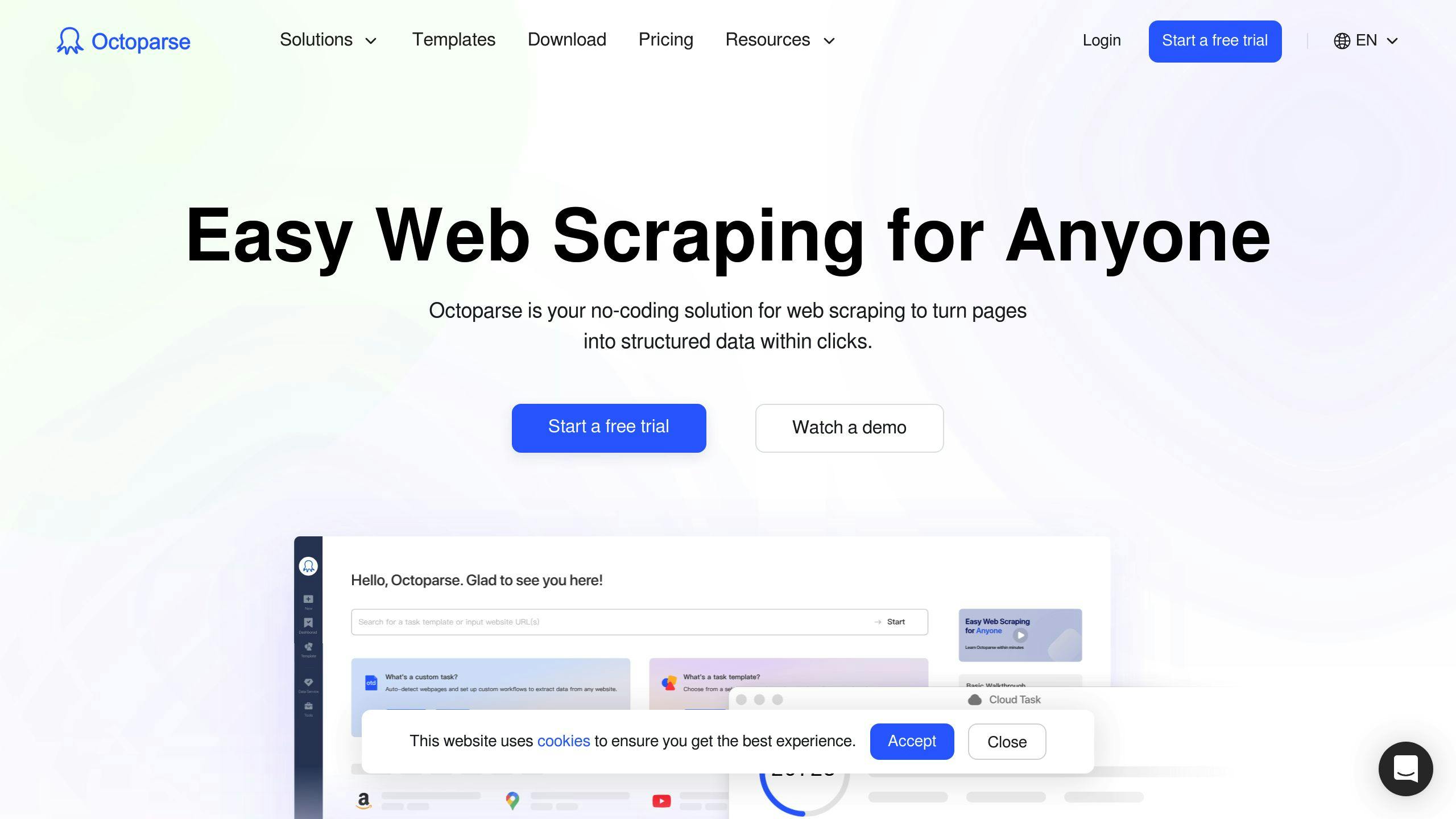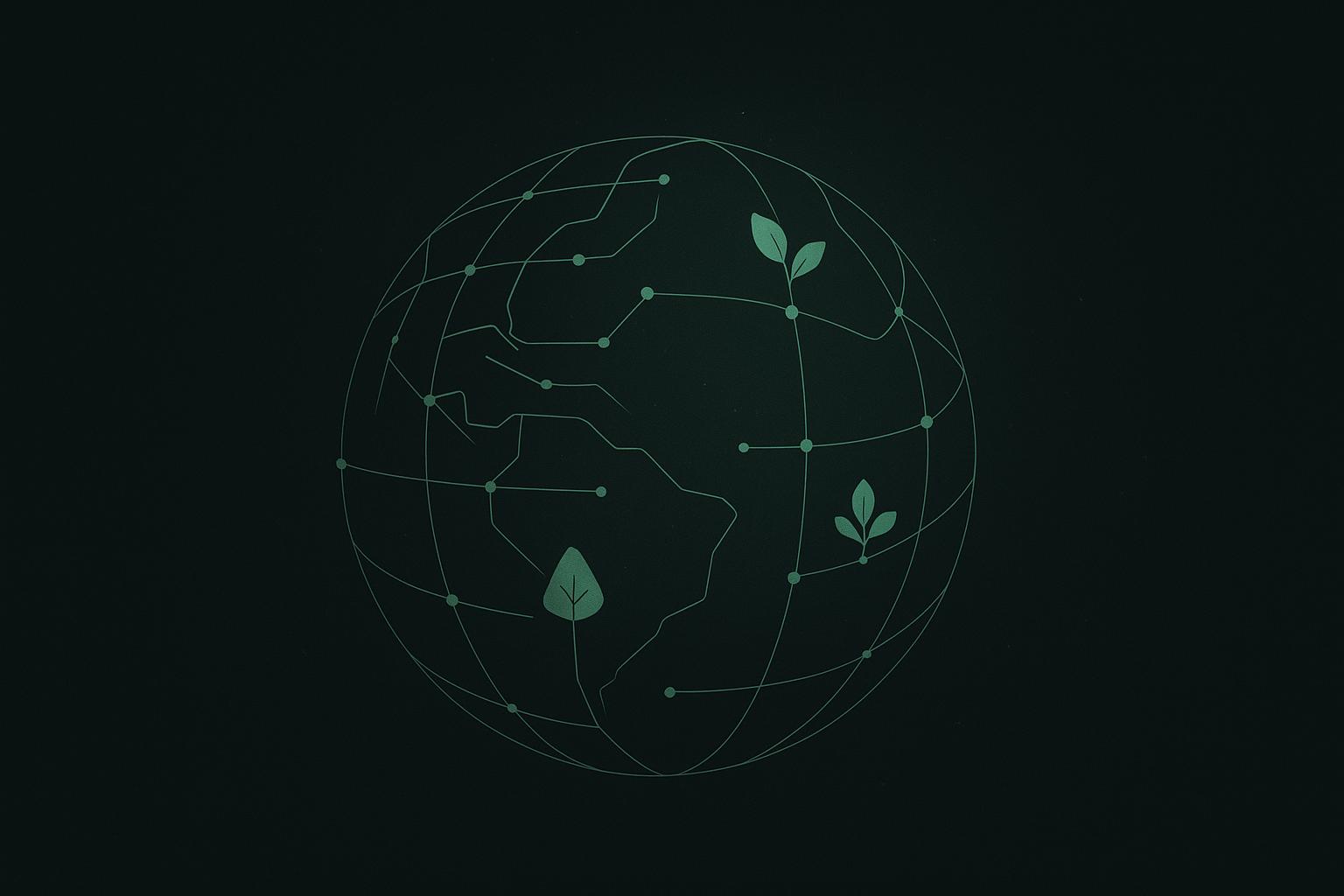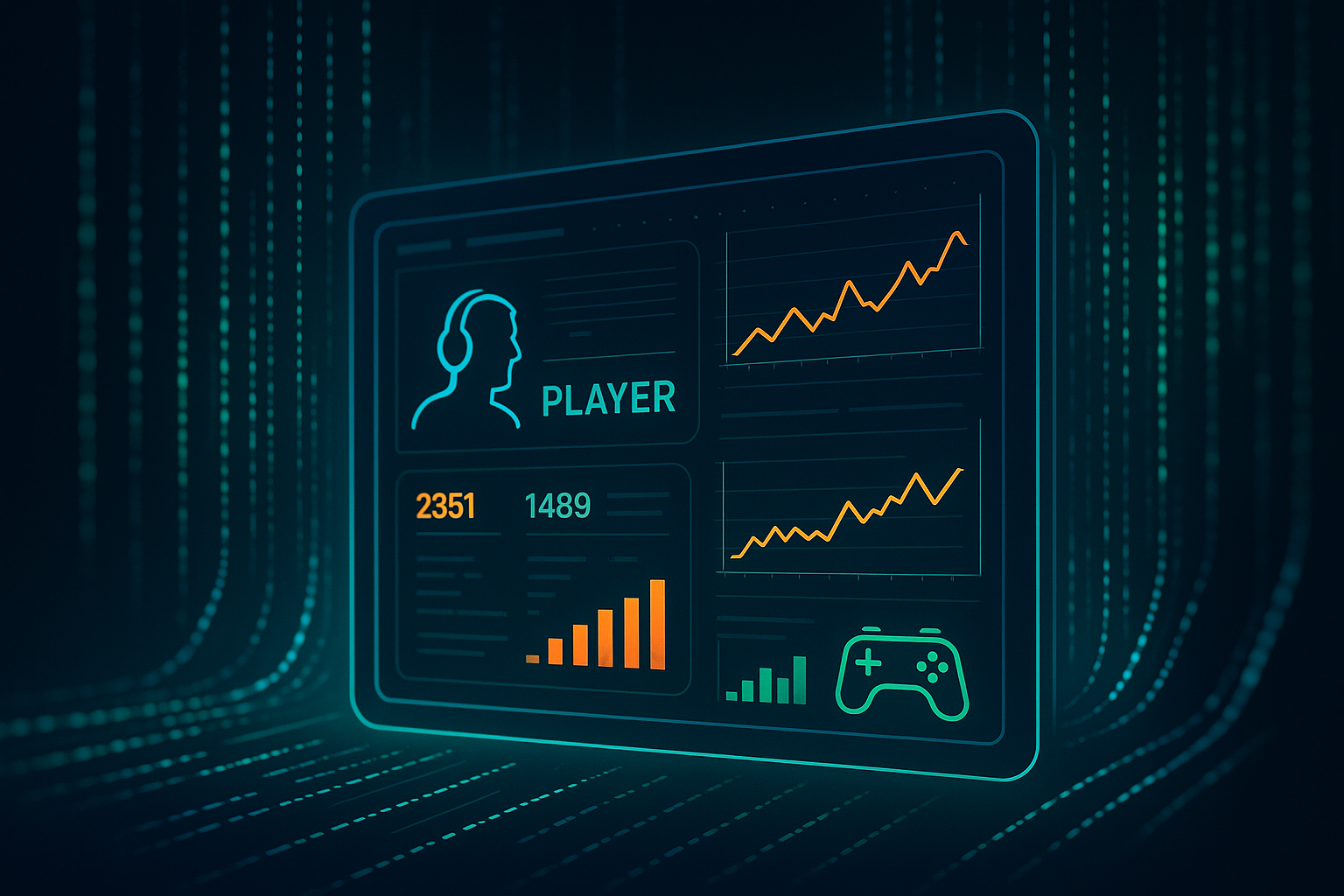AI is making web scraping faster and easier by automating data mapping, a traditionally manual and error-prone process. It helps convert unstructured web data into organized formats with minimal effort. Tools like Kadoa, ParseHub, and Instant Data Scraper use machine learning and natural language processing (NLP) to detect patterns, extract data, and adapt to website changes automatically. Here's what you need to know:
- Why It Matters: Manual data mapping is slow, error-prone, and hard to maintain as websites change frequently.
- How AI Helps: AI automates repetitive tasks, improves accuracy, and reduces maintenance by adapting to dynamic web content.
-
Top Tools:
- InstantAPI.ai: Affordable and handles dynamic content.
- Octoparse: Ideal for complex websites with automated workflows.
- ParseHub: Excels at extracting from JavaScript-heavy sites.
Quick Comparison of AI Tools for Data Mapping
| Tool | Starting Price | Best For | Key Feature |
|---|---|---|---|
| InstantAPI.ai | $9/month | Quick scraping | Handles dynamic web content |
| Octoparse | $75/month | Complex websites | AI workflow automation |
| ParseHub | $49/month | Interactive websites | Machine learning extraction |
AI is transforming web scraping by improving speed, accuracy, and scalability, making it a game-changer for industries like e-commerce, market research, and finance.
Related video from YouTube
How AI Makes Data Mapping Easier
AI simplifies data mapping in web scraping by automating the process. It analyzes web structures and extracts relevant data with minimal manual input, making it more efficient and accessible for developers and data professionals.
AI Methods for Data Mapping
AI techniques like machine learning and natural language processing (NLP) play a big role in data mapping. Machine learning identifies patterns across websites, while NLP deciphers relationships between data points, ensuring precise extraction. These methods significantly reduce the errors and inefficiencies of manual mapping.
For example, Instant Data Scraper uses AI-based pattern recognition to predict relevant data on webpages, cutting down on manual effort. Similarly, ParseHub employs machine learning to analyze webpage structures, making it easier to extract data, even from more intricate layouts.
| AI Method | Primary Function | Key Benefit |
|---|---|---|
| Machine Learning | Pattern Detection | Automatically identifies data structures |
| Natural Language Processing | Text Analysis | Understands context and relationships |
| Heuristic Analysis | Data Relevance Prediction | Speeds up the selection process |
Using Large Language Models (LLMs) in Web Scraping
Large Language Models (LLMs) are changing the game in web scraping. These models can generate scraper code on the fly and adapt to website changes, offering a near maintenance-free experience.
"Developments in AI and web scraping technologies strongly reinforce each other – one technology can offer extensive breakthroughs in the other." - CEO @ Oxylabs
Tools like Axiom.ai allow users to automate tasks like handling AJAX requests and infinite scrolling without writing code, simplifying complex extractions. Meanwhile, Kadoa Playground automates URL input and data selection, streamlining workflows and improving accuracy.
These advanced AI-powered tools are paving the way for more efficient data mapping, and we’ll dive deeper into them in the next section.
Top Tools for AI-Based Data Mapping
AI-driven tools have reshaped the way we approach data mapping in web scraping. They tackle challenges like frequent website updates and the errors that come with manual processes, making the entire workflow smoother and more dependable.
Overview of InstantAPI.ai

InstantAPI.ai streamlines web scraping with its user-friendly Chrome extension for quick automation and an enterprise-level API for more advanced needs. Its ability to manage dynamic web content through JavaScript rendering makes it a versatile choice for businesses of all sizes.
Other Tools: Octoparse and ParseHub

- Octoparse: This tool automates workflows using AI and handles complex websites with ease. Starting at $75/month, it’s tailored for advanced scraping tasks.
- ParseHub: With machine learning-based structure analysis, ParseHub extracts data from AJAX-heavy and JavaScript-driven websites. It starts at $49/month and is ideal for interactive, dynamic sites.
Feature Comparison of AI Tools
| Feature | InstantAPI.ai | Octoparse | ParseHub |
|---|---|---|---|
| Starting Price | $9/month | $75/month | $49/month |
| AI Capabilities | Dynamic content handling | AI workflow automation | Machine learning extraction |
| Free Plan | Limited requests | Limited tasks | Limited pages |
| Best For | Quick automated scraping | Complex website handling | Interactive website extraction |
| Integration Options | API access | Custom workflows | Versatile export options |
These tools highlight how AI-based data mapping can streamline processes, opening up new possibilities for businesses across various industries.
sbb-itb-f2fbbd7
Applications and Benefits of AI in Data Mapping
Building on earlier tools and methods, let's dive into how AI-driven data mapping is reshaping industries and enhancing web scraping workflows.
Examples of AI in Different Industries
AI-powered data mapping is changing the game for web scraping across various sectors:
- E-commerce: Platforms like Amazon use AI to track competitor pricing and optimize product listings, analyzing millions of data points daily.
- Market Research: Tools like Kadoa Playground help firms analyze web data efficiently, saving time and effort.
- Finance: Financial institutions monitor market trends and competitor activities with AI-driven tools.
- Healthcare: Organizations streamline the extraction of research papers and clinical trial data, ensuring quicker access to critical information.
These examples highlight how AI simplifies complex data extraction tasks while maintaining precision.
Advantages of AI for Data Mapping
| Advantage | What It Does | Why It Matters |
|---|---|---|
| Accuracy | Automates pattern recognition | Reduces errors in data extraction |
| Speed & Scale | Handles multiple websites simultaneously | Completes large tasks in minutes |
| Flexibility | Adapts to website changes automatically | Cuts down on maintenance needs |
| Cost Savings | Reduces manual work | Lowers operational expenses |
AI tools shine by automating the prediction and extraction of relevant data. They're especially effective for dynamic websites that frequently update or change.
For more complex projects, these tools can process multiple data types - like text, images, tables, and lists - while ensuring consistency across sources. This reliability is crucial for extracting data from interactive websites that traditional methods struggle to handle.
AI also tackles challenges like dynamic content, infinite scrolling, and intricate pagination systems. By automating these previously tough tasks, organizations can shift their focus to analyzing data instead of collecting it, making web scraping workflows far more efficient.
Conclusion and Future Trends
Key Takeaways
AI-driven data mapping has reshaped web scraping by turning what used to be manual, time-consuming tasks into smooth automated processes. It's particularly effective at managing dynamic web content and adjusting to site changes without needing constant human oversight.
What’s more, AI tools with user-friendly visual interfaces have made data mapping accessible for people without technical skills. Platforms like Octoparse and ParseHub have simplified data extraction, allowing organizations to handle large datasets with minimal effort.
These advancements hint at even greater possibilities as AI technology continues to advance.
What's Next for AI in Web Scraping
AI's role in web scraping and data mapping is set to expand further. As tools become more advanced, ensuring adherence to ethical guidelines and privacy laws will take center stage, addressing industry concerns around responsible data use.
| Advancement Area | Current State | Future Development |
|---|---|---|
| Dynamic Content | Handles basic JavaScript | Real-time content processing |
| User Interface | Visual tools with some coding | Natural language-driven interfaces |
| Data Integration | Manual API setups | Automated connections to analytics |
| Adaptation Capability | Needs periodic retraining | Real-time learning and self-adjustment |
Looking ahead, AI tools will focus on real-time content processing, smarter interfaces that use natural language, and better integration with analytics systems. These changes will make scraping tools easier to use, reduce maintenance, and ensure ethical data practices.
Large Language Models (LLMs) are expected to lead the next phase of innovation. They’ll enhance the ability to interpret unstructured data, enabling users to extract insights from complex web structures with minimal setup. AI will also continue addressing challenges like dynamic content and frequent website updates, making scraping more reliable.
The connection between scraping tools and analytics platforms will grow stronger, allowing organizations to move from raw data collection to actionable insights faster. This shift will make real-time decision-making based on web data a reality, cementing AI-powered scraping as a critical tool for modern businesses.
FAQs
Here are answers to some common questions about automating data extraction and incorporating AI into web scraping.
How can I automate data extraction from a website?
Tools like Instant Data Scraper and Octoparse make automating data extraction straightforward. These platforms automatically detect data structures on websites and adjust to changes, so you don’t need to rely on manual scripts. They handle the heavy lifting, saving both time and effort.
How can AI help with web scraping?
AI-powered tools combine Large Language Models (LLMs) with traditional scraping methods to streamline data extraction. They analyze websites to identify useful data points, generate code automatically, and manage dynamic content. For example, Instant Data Scraper uses AI to predict relevant data, while ParseHub excels at handling websites with complex JavaScript. These tools simplify the process, even for users without extensive technical skills.
AI tools are changing the way web scraping works, making it faster and more accessible for everyone.


